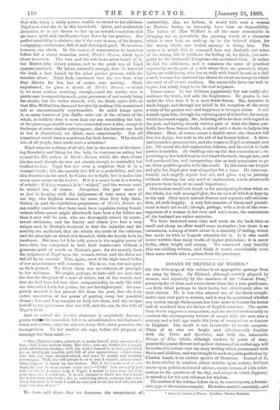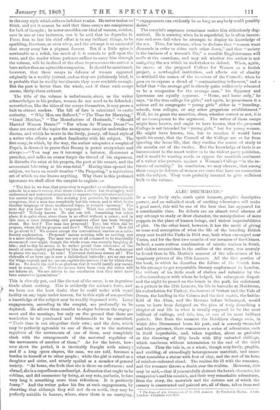ESSAYS IN DEFENCE OF WOMEN.* 0..); the title-page of this
volume is an appropriate passage from an essay by Steele. Sir Richard, although terribly plagued by women, and especially by the exactions of his dearest Prue," always spoke of them and wrote about them like a true gentleman, —a little blind perhaps to their faults, but chivalrously alive to their virtues. He it was who uttered one of the finest compliments man ever paid to woman, and it may be questioned whether any author except Shakespeare has done more to honour the better half of mankind than the father of English essayists. The motto from Steele suggests a comparison, and we are led involuntarily to contrast the contemporary writers of essays with the men who a century and a half ago made this form of composition so famous in England. The result is not favourable to recent essayists. Those of us who are deeply and affectionately familiar with the Taller and Spectator, and with the inimitable Essays of Elia, which, although modern in point of time, possess the quaint flavour and mellow richness of an earlier age, will be inclined to believe that the essay writing which commenced with Steele and Addison, and was brought to such exquisite perfection by Charles Lamb, is an extinct species of literature. Instead of it, we have studies in conduct, clever articles upon society, brilliant tracts upon politics and social science, essays crammed with information on the questions of the day, and essays in which flippancy is mistaken for wit and triteness for wisdom.
The author of the volume before us is, in some respects, a favourable type of the modern essayist. He writes smartly, smoothly, and in the easy style which suits an indolent reader. He never makes us think, and yet it cannot be said that these essays are conspicuous for lack of thought ; he never ennobles our ideal of woman, neither, save in one or two instances, can it be said that he degrades it.
From first to last his chief effort is to say brilliant things, to be sparkling, facetious, or even witty, and the attempt is so successful that every essay has a piquant flavour. But if a little spice is serviceable as a relish, too much of it is certain to pall upon the taste, and the reader whose patience suffices to carry him through the volume, will be inclined at the close to pronounce the author a bore rather than an agreeable companion. It should be mentioned. however, that these essays in defence of women appeared originally in a weekly journal, and as they are judiciously brief, it is probable that in weekly instalments they were readable enough. But the part is better than the whole, and if three such essays amuse, thirty-three exhaust.
The title of the volume is unfortunate, since, as the writer acknowledges in his preface, women do not need to be defended ; nevertheless, like the titles of the essays themselves, it may prove a bait to attract readers. The bill of fare is calculated to excite curiosity. " Why Men are Refused," " The Time for Marrying," " Good Matches," " The Manufacture of Husbands," " Should Married Women Dance?" "For whom do Women Dress?"— these are some of the topics the anonymous essayist undertakes to discuss, and which he treats in the lively, jaunty, off-hand style of a writer who affects a perfect familiarity with his subject. The first essay, in which, by the way, the author misquotes a couplet of Pope's, is devoted to prove that Beauty is power everywhere and always :—" You may see it interrupt a lecturer, disconcert a preacher, and make an orator forget the thread of his argument. It disturbs the saint at his prayers, the poet at his sonnet, and the accountant labouring at his sum-total." Having thus opened the subject, we have an occult treatise " On Proposing," a mysterious art of which no one knows anything. Why there is this profound ignorance we shall allow the essayist to explain :—
" The fact is, we fear, that proposing is regarded as so disagreeable an episode in a man's career, that there exists a silent but thoroughly well understood and universal conspiracy to suppress the particulars and hush the matter up altogether. One evening you perceive, by unmistakable symptoms, that a man has completely lost his reason, and is what, in the familiar language of these unclassical times, is termed • spooney.' The next day you hear that he is ' engaged.' What has occurred in the interval? Nobody knows. No one can tell. Something has taken place, it is quite clear, since there is no effect without a cause ; and in this case, a most interesting and portentous effect has been brought about. But how ? The man has proposed ! Yes ; but when did ho propose, where did he propose, and how ? What did he say ? How did he go about it ? We cannot accept the conventional answer as a satisfactory explanation. 'Proposed' means nothing, tells us nothing, and is a mere subterfuge. The man was not at all ashamed to be frantically enamoured over-night, though the whole room was secretly laughing at him ; and to-day he seems to be rather proud than otherwise of the result of some exploit performed by him in the interval. We endeavour to pierce the mystery. In vain! Universal darkness covers all ! The chrysalis of an hour ago is now a full-fledged butterfly ; yet no one saw the wings expand, and no one can explain the process to us by which they did so. No doubt the end is so glorious that it would justify any means used to compass it. What the means have been even the victor will not inform us. We are driven to the conclusion that they must have been somewhat ignominious."
This is cleverly put, and like the rest of the essay, is an ingenious tirade about nothing. This is evidently the author's forte, and we have not the least doubt that he could write with equal facility on any topic under heaven, for in this style of composition a knowledge of the subject may be readily dispensed with. Long engagements, according to the essayist, are profoundly to be deplored. He allows three months to elapse between the engagement and the marriage, but only on the ground that there are wardrobes to be purchased and bridesmaids to be consulted. "Their time is not altogether their own ; and the date, which may be perfectly agreeable to one of them, or to the maternal regulator of the movements of one of them, may completely clash with the arrangements of the maternal regulator of the movements of another of them." As for the lovers, however short the period, it is inevitably fraught with misery ; and if a long space elapses, the man, we are told, becomes a burden to himself or to other people ; while the girl is ruined as a daughter and sister, and utterly spoiled as a member of general society. " At home, she feels that she is there on sufferance ; and abroad, she is a superfluous nondescript. Asituation that ought to be sublime, and did commence by being, at any rate, pathetic, before very long is something more than ridiculous. It is positively funny." And the writer pokes his fun at such engagements, by observing that although they will not do on earth, they may be perfectly suitable in heaven, where, since there is no marrying, The essayist's assurance sometimes makes him ridiculously dogmatical. He is amusing when he is superficial, he is often inaccurate and even dull when lie attempts to display his knowledge of the sex. Thus, for instance, when he declares that "women want diamonds in order to shine each other down," and that "society is the business of a woman's life," a sensible Englishwoman will smile at the assertions, and may ask whether the author is not maligning the sex which he undertakes to defend. 'When, again, he sneers at the proposed College for Women as a foolish project, a newfangled institution, and affects out of charity to withhold the names of the members of the Council ; when he goes on to express a dread of " contaminating influences," and a belief that " the average girl is already quite sufficiently educated to be a companion for the average man," his flippancy and ignorance are equally apparent. "Home, and home only," he says, "is the true college for girls ;" and again, he pronounces it a serious evil to congregate " young girls" either in " boardingschools, true colleges, or any other gregarious establishment." Well, let us grant the assertion, since, whether correct or not, it is of no consequence to the argument. The writer of these essays might have known, and ought to have known, that the proposed College is not intended for "young girls," but for young women. He might have known, too, but to mention it would have spoilt his essay, that the Council of the College are so far from ignoring the home life, that they confine the course of study to six months out of the twelve. But the knowledge of facts is as inconvenient to the smart writer as to the violent party politician, and it would be wasting words to oppose the mawkish sentiment of a writer who protests against a 'Woman's College "in the interests of morality." In conclusion, we may observe, that among these essays in defence of women arc some that have no connection with the subject. They were probably inserted to give sufficient bulk to the volume.



































 Previous page
Previous page